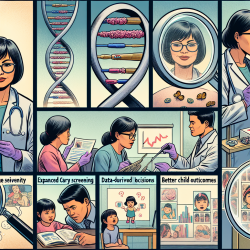As Special Education Directors, we constantly seek to enhance our knowledge and skills to better serve our students. One area that demands our attention is Developmental Coordination Disorder (DCD). According to the research article "Toward An Understanding of Developmental Coordination Disorder: Terminological and Diagnostic Issues" by Sheila E. Henderson and Leslie Henderson, understanding the terminological and diagnostic nuances of DCD is crucial for effective intervention.
The research emphasizes the importance of clear terminology and accurate diagnosis in managing DCD. The authors highlight that despite increased awareness over the past two decades, there are still unresolved terminological issues that can impact diagnosis and treatment. The article discusses three principal competing labels for DCD and underscores the preference for the DSM IV term 'Developmental Coordination Disorder'. This clarity in terminology helps practitioners communicate more effectively and align their interventions with recognized standards.
One of the significant takeaways from the research is the need to shift from a purely normative approach to diagnosis, which relies on comparing a child's motor skills to those of peers, to a more nuanced approach that identifies specific pathological signs. This shift can lead to more accurate diagnoses and tailored interventions that address the unique needs of each child.
To implement these insights in your practice, consider the following strategies:
- Adopt Clear Terminology: Use the term 'Developmental Coordination Disorder' consistently to avoid confusion and ensure that your communication is aligned with current diagnostic frameworks.
- Focus on Pathological Signs: Train your team to identify specific positive signs of DCD rather than relying solely on normative comparisons. This approach can lead to earlier and more accurate diagnoses.
- Collaborate with Experts: Engage with occupational therapists, physical therapists, and other specialists to develop comprehensive intervention plans that address the motor skill challenges associated with DCD.
- Continuous Education: Encourage your team to stay updated on the latest research and developments in the field of DCD. Attending conferences, webinars, and reading relevant publications can provide valuable insights.
Moreover, the research points out the high degree of overlap between DCD and other developmental disorders, suggesting that DCD might not be a distinct syndrome. This finding emphasizes the need for a holistic approach to diagnosis and intervention, considering the possibility of co-occurring conditions. By understanding the broader context of a child's developmental challenges, practitioners can develop more effective, individualized intervention plans.
In conclusion, the research by Henderson and Henderson provides valuable insights into the terminological and diagnostic issues surrounding DCD. By adopting clear terminology, focusing on pathological signs, collaborating with experts, and committing to continuous education, practitioners can improve their skills and better support students with DCD.
To read the original research paper, please follow this link: Toward An Understanding of Developmental Coordination Disorder: Terminological and Diagnostic Issues.










